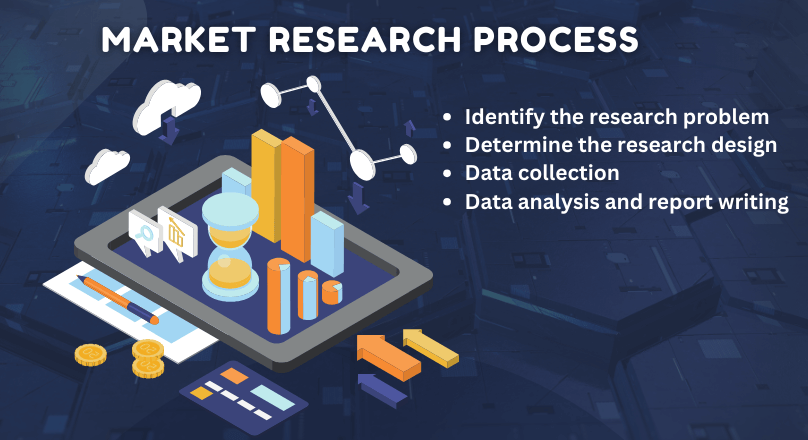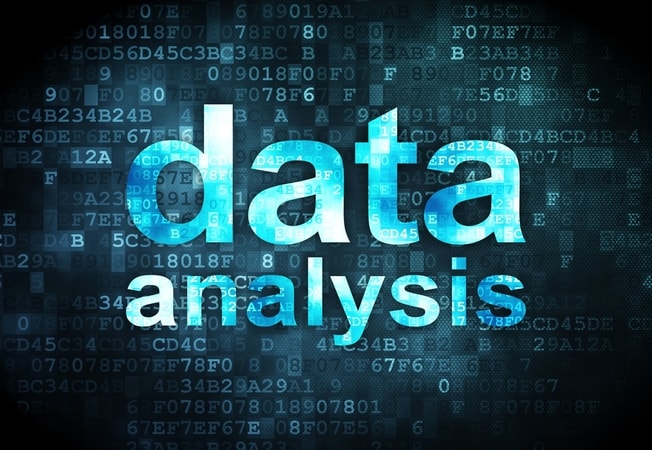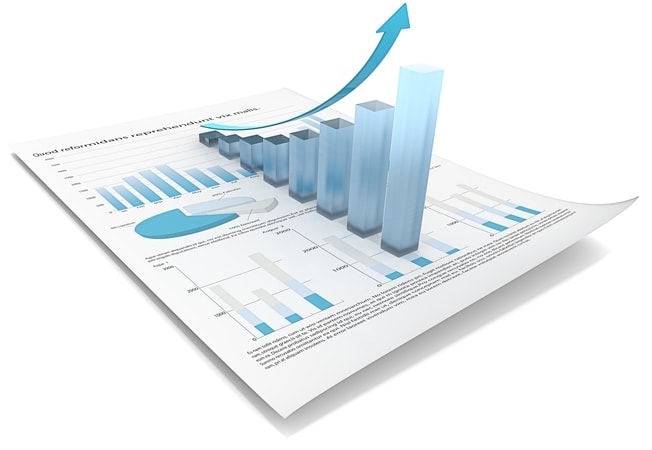Get Outstanding Market Research Services from Our Data Experts
Market research involves getting customer feedback to support business decisions. It is a systematic process of getting, analyzing, and interpreting data about business trends and consumer behaviors. If you are looking for market research services, our team will be glad to assist you until you achieve the desired business results.
The purpose of market research is to address an information gap that will help a business make an important decision to meet customer demands and introduce new market products. It uses both qualitative and quantitative methods to gain valuable insights into the study. Market research can be done to deal with:
- Narrowing down a broad range of ideas to eliminate possibilities to choose the best option.
- Generating new ideas and possibilities.
- Monitoring relative change such as brand awareness.
- Predicting the future.
- Evaluating challenges faced in the past.
- Exploring consumer's in-depth motivations.
A business can choose to conduct the research or consult market research experts, like us, to carry out the analysis for them. It is usually done through surveys, interviews, or eye tracking. However, due to recent technology developments, most of these market research methods can be done online. A recent survey done in 2024 shows that 87% of market researchers worldwide do online qualitative research, for example, Market Research Online Communities [MROCs] and open-ended surveys.
Market research consists of a combination of primary and secondary research. There are two modes of primary market research, exploratory and confirmatory. Exploratory research techniques mostly use qualitative research methods where the researcher gauges the quality of different customer responses.

Confirmatory research techniques, on the other hand, use quantitative research methods. The researcher gauges the strength of the quality of responses given by customers during the exploratory phase. The difference between qualitative and quantitative research is that qualitative research is response-led while quantitative research is question-led. Secondary market research mainly uses external sources of data such as research conducted by other businesses in the same sector or data collected by the Census Bureau.
Getting Market Research Services
Getting business market research services from market research experts can help businesses gain accurate strategic insights for decision-making through a data analysis report. This can in turn lead to increased profits and business growth. So, how do these experts plan and conduct the market research?
Planning for the Market Research
Step 1: Identify the research problem
This is a very crucial step since the level of understanding of the research problem by the researcher the more the results of the market research will make a significant difference. The researcher should take the time to fully develop the research problem to avoid partially solving the research problem being studied.
Step 2: Identify information gap
After the identification of your research problem, the researcher identifies an information gap. They highlight the key questions that should be answered before making the decision. It answers questions such as: does the research use one or more research techniques? Can the research question be answered with the available resources?
Step 3: Find the appropriate research methodology
The researcher evaluates which methods, qualitative and quantitative will be most appropriate to answer the research question at hand. Some research methodologies are such as face-to-face interviews, focus groups, surveys, or experiments.
Step 4: Design the research study
A research study is a strategic investigation that is aimed at getting new information or understanding a theory about a specific topic. The research study states the main objectives that guide the study, the participants, and the estimated time frame and budget for carrying out the study.
Types of Market Research Methodologies
Various types of market research can be used to collect data for conducting the market research. If the business is hiring an expert for business research services or conducting the research themselves, these methods can help them gain valuable insights. Below is a comprehensive guide to these methodologies:
1. Survey
A survey is a method of collecting information from a group of people by asking them questions. This group is carefully selected to represent the target audience of a particular product. A business can also employ market research survey companies to design and conduct surveys that collect data on consumer trends and preferences. These companies carry out these market research surveys on behalf of the company contributing to strategic decision making.
2. Secondary sources
This is second-hand data that has been collected by other sources which is also relevant to the researcher’s topic of study. Common secondary sources in market research are such as articles in the press, reports by firms, and Google documents. One can also choose to use big data. These are forms of external secondary research, internal market research sources are such as existing market research reports. Big data can be analyzed using programs such as SPSS, R, Python, and STATA.
3. Customer visits
This involves face-to-face interviews or observation. Regular customer-trader interactions can help the trader to gain valuable insights into new product opportunities. Interaction with customers together with focus groups helps in generating new business ideas. Market research experts can do consumer research services like organizing focus groups that help draw meaningful insights.
4. Experiments
The researcher could experiment to test the impact of a certain factor. A common example of experimentation in market research is A/B testing. It works in the way that the researcher could want to determine which appeals to use in an e-mail promotion and they want to know which one will bring more customers to the company’s website. They could draw a sample of 800 email addresses randomly assign 400 each to get alternative versions and then gauge the number of visits to each website.
How to Budget for Your Market Research
Planning the budget for your market research is a very crucial step in conducting the market research. Whether you are getting market research services or carrying out the research yourself, budgeting for it is very crucial. So, how does one budget financially plan for their market research?
One can use a very simple equation to plan out their research budget. This equation is:
Market Research Budget = K×R×1/F
Where K is the amount at stake for the research being carried out.
R is the reduction in the odds, expressed as a percentage.
F can be the desired return on investment [ROI]on the market research expenditure.
The use of the budget equation becomes useful when combined with the basic cost of carrying out market research. The results obtained from the disposable amount [K] and the reduction in odds [R] are just assumptions and would not be fully accurate. Letting the desired ROI be a number like 10, 15, or 20 is more likely to make an investment larger than itself as opposed to using an ROI of 2 or 3. The researcher should aim for an ROI larger than 5 for it to be a worthy investment.
Benefits of using the Market Research Equation
Calculating the budget of your market research reduces the odds of making an expensive error and increases the chances of making a profitable action.
The equation shows businesses that market research is a good investment based on the ROI.
The equation serves as a lever for use to convince managers to carry out market research for strategic decision-making.

Conducting Market Research
Below is a comprehensive step-by-step market research process.
Step 1: Identify and formulate the problem
The first step in conducting market research is identifying the research problem. A researcher should identify the marketing problems and opportunities. The marketing problems are such as a decrease in market shares and low sales while a marketing opportunity is the benefits that the business offers. A business can have two types of research problems: defined problems and ambiguous problems. Defined problems are those in which the researchers know the cause and solution, unlike ambiguous problems.
Step 2: Determine the research design
The research design is important for the formulation of the problem. Every research design has different uses and applies different analysis techniques. For example, while ambiguous research problems can be solved by exploratory research, defined research problems can be solved by either descriptive or causal research.
Market researchers can use exploratory research to give a comprehensive description of customers or competitors. For example, how large is the American market for pre-cooked mimosas? How many new products were launched by our competitors last month? Descriptive research helps us answer those questions. This research design also gauges company performance.
Causal research on the other hand can be used by market researchers to understand the relationship between multiple variables. For example, this research design can be used to check the correlation between the price of a product and the total sales of the product.
Step 3: Choose a method of data collection
Before choosing the methodology, the market researcher should choose a sampling plan. Sampling is choosing a small group of people to represent the larger population. The researcher chooses the preferred method of data collection whether it's using secondary data or conducting their research.
Step 4: Data collection
Collecting data is a practical process of the market research process. The researcher decides on the data collection methods based on the methodology chosen. They can choose to hire a market research survey company or conduct the surveys and interviews themselves. Data collection requires careful planning and extensive knowledge of the marketing process.
Step 5: Analyzing data
Technical skills are required for this step. Data analysis involves saving, cleaning, and describing data. Specialized software is often used to save data into a data set. Examples of this software are such as: Epidata which is used to enter data from paper-based surveys and Entryware’s mobile survey used to enter data from face-to-face interviews.
Cleaning data is the next step in the data analysis process. The data is cleaned from data entry errors, outliers, missing data, suspicious response trends, and interviewer fraud. Outliers are values that are way farther than the others which affects results. For example, a researcher may be comparing the average income of 10 households, the income range may be between $5000 and $10,000. If there was an additional household with an income of $150,000 then this is an outlier.
The last step of data analysis is describing data. Data can be described one variable at a time using univariate statistics or in terms of multiple variables using bivariate statistics. Univariate statistics are such as bar charts, histograms, and measures of central tendency while bivariate statistics are such as scatterplots and crosstabs.
Step 6: Discuss, Interpret, and Present findings
This section explains the project context to the reader. The researcher should describe the research procedure used, the methodologies, and why they were used to collect data. They should be cohesively explained for easy understanding to the reader. One should also include copies of the material used such as the questionnaires.
The market researcher needs to explain the research findings and how they relate to a solution to the research problem. They can summarize the original findings and then analyze them in subgroups.
Lastly, use statistical tables and graphs to present statistical data. They structure information comprehensively allowing easy understanding to the reader.
Step 7: Follow up
The last step is conducting follow-up research on previously conducted research. This can reveal more market gaps that need market research.
Why Choose Our Market Research Service
Our market analysis services are the best in the market and this can be approved by the multiple successful market research services we’ve done for our clients. Choosing us is choosing quality, so why should you choose our services?
- Experienced professionals with extensive knowledge in the market research field.
- Timely delivery of your results for strategic decision-making.
- Customized solutions tailored to your specific needs.
- Comprehensive guidance by our professionals throughout the market research process.
- Our services are very affordable catering for all audiences.
Summary
Market research is the outcomes of conducting research such as a database of customer purchases, or checking reports to get recommendations. It is very valuable for making strategic decisions in a business setting. The decision to conduct market research can be taken when managers face an uncertain situation or when the cost of carrying out certain research is lower than the expected benefits after conducting the research.
Businesses can choose to conduct the business research themselves or choose a marketing research expert to conduct the market research for them. Whichever method they choose, they can make strategic insights which are crucial for decision making. Are you looking for experts to handle your market research needs? Look no further because our services are the best! Visit our website today to get started.





